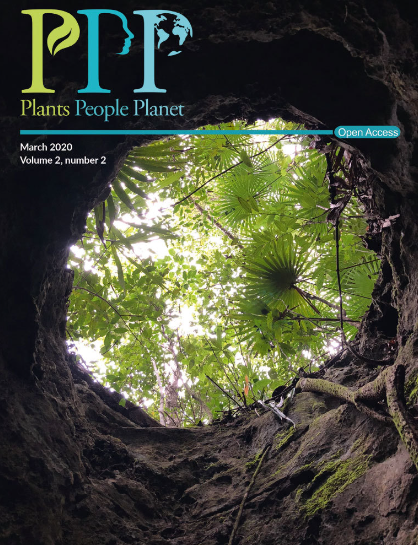Empowered through our diversity: How to bring in a new age of plant science collaboration
IF 3.6
2区 环境科学与生态学
Q1 BIODIVERSITY CONSERVATION
引用次数: 1
Abstract
Climate‐change and land‐use intensification are degrading ecosystems globally, impeding their services to humans (e.g., food security and human health). The United Nations 13th and 15th Sustainable Development Goals (SDGs) call for action to protect and restore ecosystems. Only transdisciplinary research can unravel the multitudes of interacting ecosystem parts that could help accomplish these SDGs. However, a major challenge will be overcoming material, social and other types of barriers that prevent collaborations. This study explores some of these challenges and seeks the views of the community through a survey to help develop a new age of plant science collaboration.In this opinion article, we explore the problem of missed opportunities for collaboration in fields related to plant science. Lack of awareness of the scientific output, which can be gained from transdisciplinary collaborations, as well as the opportunities they can provide for early‐career scientists, may contribute to this. Here, we name communication barriers as particularly inhibitory to the formation of collaborations and propose possible solutions to overcome these barriers. Eventual action towards these solutions needs to be based on the opinions of the community. We thus intend this article to initiate a dialogue among researchers across the many disciplines of plant science about the feasibility of these proposed solutions. The questionnaire included with this article, intended for the broad plant research community, we believe could help us gain the necessary information to proceed in addressing communication barriers to transdisciplinary science collaborations. We provide a theoretical framework, examples and timely topics as discussion points to inspire participants of the questionnaire to contribute their voice to shaping a new age of plant science collaboration.多样性赋予我们力量:如何开创植物科学合作的新时代
气候变化和土地利用加剧正在使全球生态系统退化,阻碍其为人类提供服务(如粮食安全和人类健康)。联合国第13个和第15个可持续发展目标呼吁采取行动保护和恢复生态系统。只有跨学科的研究才能解开有助于实现这些可持续发展目标的众多相互作用的生态系统部分。然而,一个重大挑战将是克服阻碍合作的物质、社会和其他类型的障碍。这项研究探讨了其中的一些挑战,并通过一项调查寻求社区的意见,以帮助发展植物科学合作的新时代。在这篇观点文章中,我们探讨了在植物科学相关领域错失合作机会的问题。缺乏对跨学科合作所能获得的科学成果的认识,以及对这些成果为早期职业科学家提供的机会的认识,可能是造成这种情况的原因。在这里,我们将沟通障碍称为对合作形成的特别抑制,并提出了克服这些障碍的可能解决方案。这些解决方案的最终行动需要基于社区的意见。因此,我们打算通过这篇文章在植物科学的许多学科的研究人员之间就这些拟议解决方案的可行性展开对话。本文中包含的问卷旨在为广大的植物研究界提供,我们相信这可以帮助我们获得必要的信息,以解决跨学科科学合作的沟通障碍。我们提供了一个理论框架、例子和及时的主题作为讨论点,以激励问卷参与者为塑造植物科学合作的新时代贡献自己的声音。
本文章由计算机程序翻译,如有差异,请以英文原文为准。
求助全文
约1分钟内获得全文
求助全文
来源期刊

Plants People Planet
Multiple-
CiteScore
9.90
自引率
5.90%
发文量
81
审稿时长
12 weeks
期刊介绍:
Plants, People, Planet aims to publish outstanding research across the plant sciences, placing it firmly within the context of its wider relevance to people, society and the planet. We encourage scientists to consider carefully the potential impact of their research on people’s daily lives, on society, and on the world in which we live. We welcome submissions from all areas of plant sciences, from ecosystem studies to molecular genetics, and particularly encourage interdisciplinary studies, for instance within the social and medical sciences and chemistry and engineering.
 求助内容:
求助内容: 应助结果提醒方式:
应助结果提醒方式:


